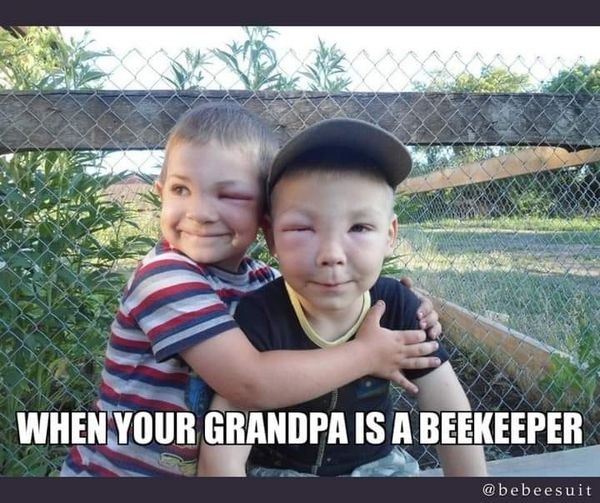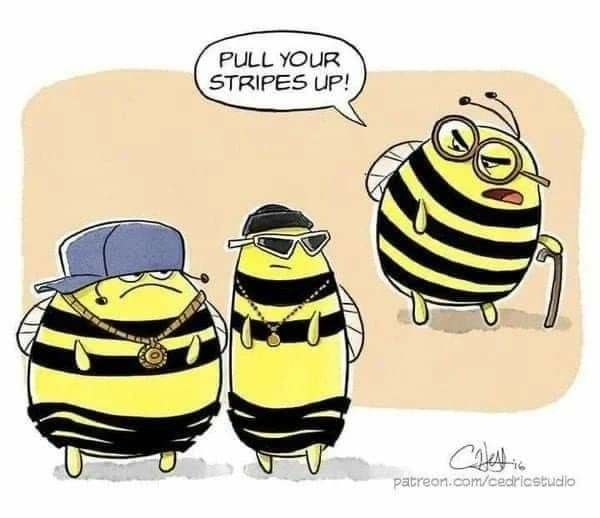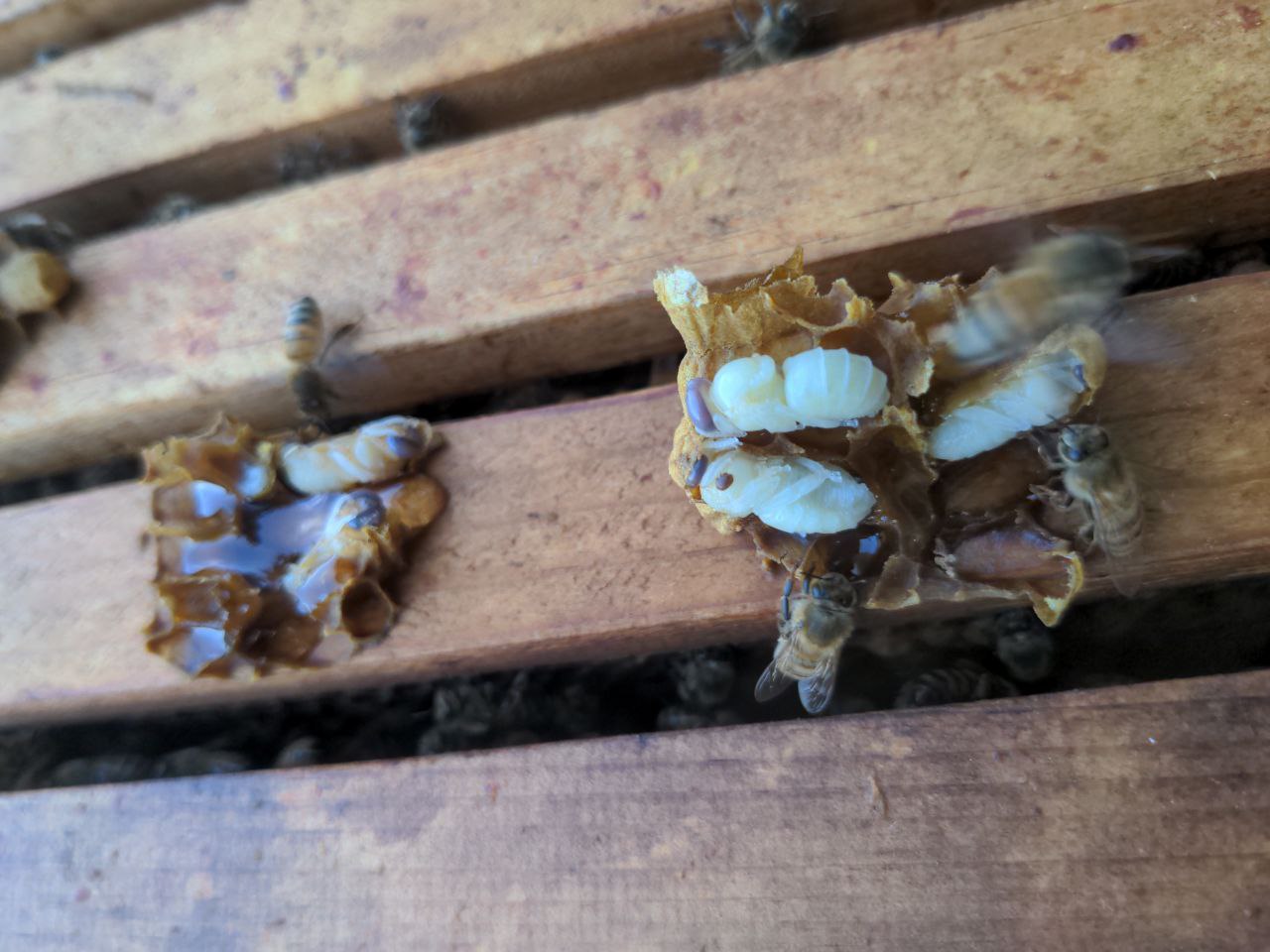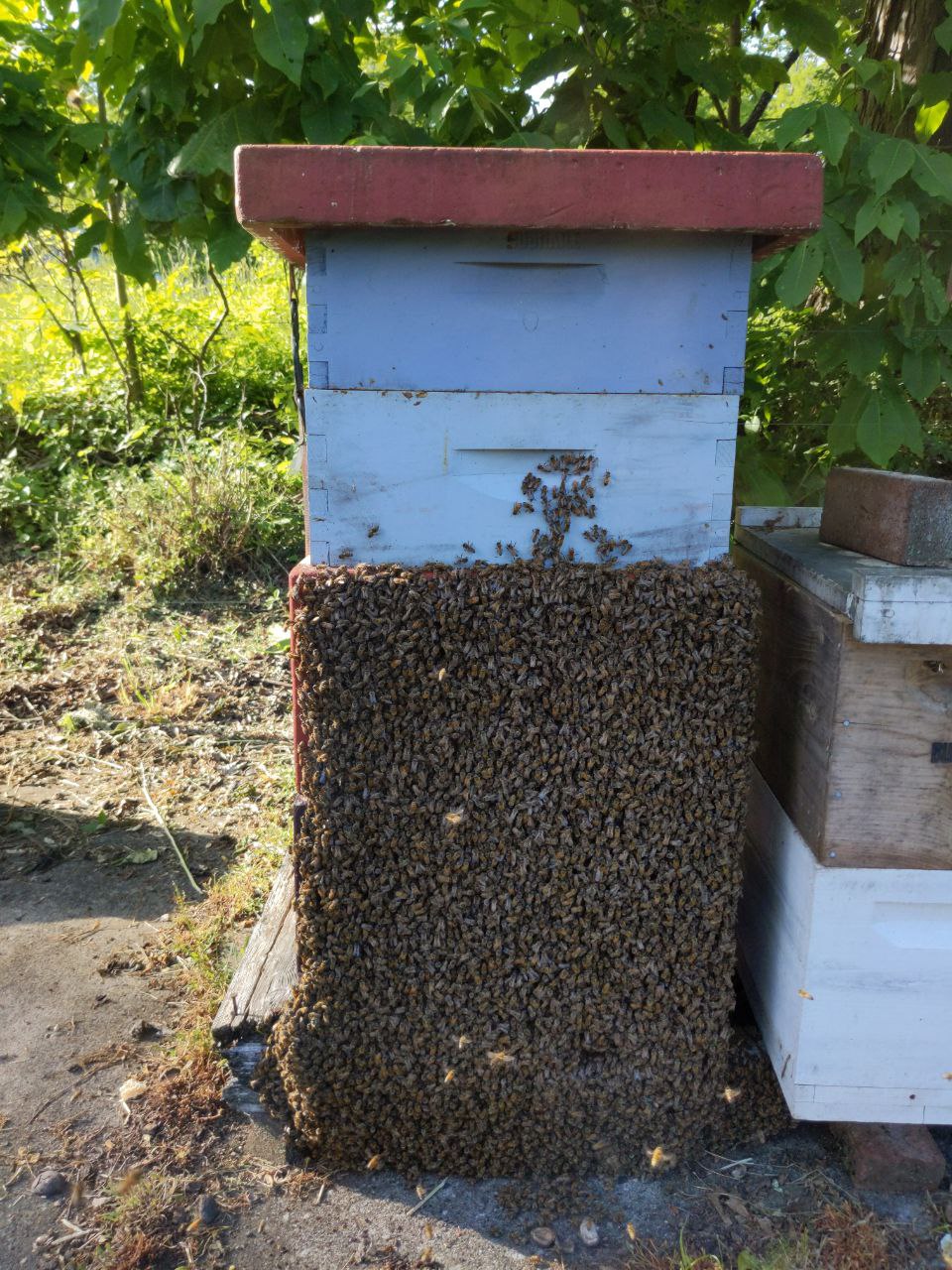|
|
Greetings Hello,
Our June BeeGroup meeting is next Tuesday (6/18) starting at 5:45PM. We will continue our summer tradition of hands-on meetings in members apiaries. This month we will be meeting at Joe & Linda Previll's, 50 Peak Farm Road, Stone Ridge, NY 12484
|
Unfortunately the weather wasn't on our side last year and we had to cancel. Let's hope for better luck this year.
|
Bring your bee jacket, Veil, gloves, etc. I will have extra protective gear for those who don't have any yet.
|
|

|
Queen 16 Days, Worker 21 Days, Drone 24 Days...Capped at 9th Day...
|
Please check the Resources section below...
|
If you have any topics, ideas, selling bee equipment, or questions, feel free to contact us at BeeGroup@HVHiives.com.
|
|
|
|
|
|
|
|
Bee stings are perhaps the biggest hurdle for people starting beekeeping. The anxiety and fear can often cause erratic movement while inspecting the hive which in turn get the bees a little riled. The calmer one is while working the bees the less likely you are to cause self inflicted stings. I know it is easier said then done, but it comes with experience (and stings!).
|
The more you get stung, the more your body gets use to it and the reaction lessens. Or does it? This week I came across a person, a seasoned beekeeper, who all of a sudden had an anaphylactic reaction to a sting. I have experienced anaphylactic reactions (not from bee stings) and know just know how scary it can be, we are talking possible death. This is not the first time I have come across an experienced beekeeper who all of a sudden had an anaphylactic reaction to getting stung. If you every get stung and start feeling a tingling in your tongue, seek medical help immediately. I use to suggest to new beekeepers whom where concerned with the possibility of an allergic reaction to speak with their doctor and get a prescription for an epi-pen, but that was before the cost sky rocketed. Your doctor can also send you to be tested if you are worried.
|
This bought back memories of my time working with Dr. Amber Rose, a bee venom therapy expert. There is a positive side to bee stings and many folks have had great relief from debilitating illnesses through bee sting therapy. Even if you are a healthy person, I think there is a lesson to be learned from Amber's treatment protocol. At the time, over a decade ago, Amber had stung over 10,000 people and never had anyone have an anaphylactic reaction. Although she always took precautions with test stings and was prepared for the worse, she had a simple protocol she insisted everyone who was getting sting treatments followed. The protocol was 3000mg of vitamin C daily while being treated and no alcohol 24hrs before being stung. Amber claimed that the body needs vitamin C to create cortisol, the natural cortisone the body uses to help relieve pain, swelling and irritation at the sting site. Anaphylaxis is caused by a deficiency in vitamin C that inhibits the creation of cortisol. I personally have noticed when I take vitamin C regularly during bee season my reactions to stings is greatly reduced. Stings still hurt like hell for 30 seconds, but it is often times that 5-10min later I can't even find the sting site. So even if you aren't concerned with allergic reactions, it still might be worthwhile to try taking vitamin C daily during bee season and see if it reduces the discomfort from stings. Reducing or eliminating the anxiety of getting stung definitely will make you a better beekeeper.
|
I didn't get into the medical benefits of bee venom therapy, but I have dug up the 2 podcasts we did with Amber Rose on the Wildlife Pro Network during my time working with her. They are well worth a listen if you wish to learn more.... Happy Stinging!
|
|
|
|

|
|
|
|
|
The Unexpected Sweetness of the Spotted Lanternfly
|
|
|
The unlucky, unloved invasive lanternfly has one benefit: It’s leading to copious production of a new type of honey.
|
|
|
|
|
Ditch the drizzle: the comb honey comeback is here
Step back in time to the nostalgic kitchen of the past with its unique scents and traditions. Explore the memories of comb honey and burnt toast.
|
|
|
The kitchen of my youth smelled of lye soap, smoked bacon, and peck baskets of walnuts. A throwback to the 40s, the kitchen had a linoleum floor and a table topped with red-and-white checked oilcloth. (Oh, how I miss the lead in my diet!) In the center sat the perennial must-haves of the day: salt, pepper, a squat vase of pansies, and a glass dish of comb honey.
|
|
|
|
Bee Humor...
|

|
|
|
|
|
Photos of the Month...
|
Always check drone larvae for varroa mites.
|
|

|

|
|
|
|
|
Resources:
|
Critical Thinking Beekeeping
|
|
Rob Overton presentation to Wake County Beekeepers
|
|
Commercial Queens-Nosema and Low Sperm Count
|
|
Constructive Beekeeping - Ed Clark, 1918
|
|
SABA (Southern Adirondack Beekeepers)
|
Lots of great information from this Club's website, many articles, and many lectures and seminars by various people in the worlds of beekeeping. Lot's of knowledge to be had here and worth your while.
|
|
A SAD DAY IN THE BEE YARD...
|
Beltsville Lab: If your bees die, God Forbid!, please send a sample to the Beltsville Lab in Maryland. The analysis is free and they will email you the results. They check for Nosema and Mites. I sent a sample down a month ago and my hive was loaded with mites -- in December! Please share results with Rob,Tom and the BeeGroup so we can help keep tabs on what is happening in the 'hood. Thanks! CLICK HERE for details on how to submit a sample.
|
|
Talks about nutrition for your bees. This will impact how your bees can fight off disease and ultimately survive.
|
|
For Honeybee information, videos, podcasts and workshops please visit the links below. Workshops are being updated as we speak!
|
|
Dave Cushman Beekeeping Website maintained by Roger Patterson.
|
NOSEMA: Treatment Procedure. Don't forget to treat for Nosema! Click Here for procedure.
|
|
HONEYBEE LIFE CYCLE - Very Important to know. This is the building block of understanding your hives.
|
Queen 16 Days, Worker 21 Days, Drone 24 Days...
|
These are a Few Videos that You May Find of Interest (I particularly like the Skep video!
NY Bee Wellness - Diagnostics
|
|
|
|
|
|
|
|
|
|